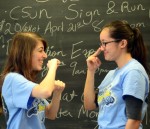As audience members wave their hands in appreciation, fingers spread next to their faces, they enter a different world where applause is silent.
More and more the deaf community is breaking into popular media through popular shows like “Switched at Birth” and well-known deaf performers, challenging the perceived stigma associated with deafness. Similarly UCLA’s American Sign Language (ASL) club “Hands On” strives to bring deaf culture to campus by using music, comedy and film as a vehicle for education. Tonight, the club will host deaf icon and comedian CJ Jones for the first deaf comedy show on campus.
“I think the most important thing is to spread awareness through entertainment. A lot of people don’t understand deaf culture or even know that there is a deaf culture,” said vice president of “Hands On” and second-year linguistics and psychology student Mariam Janvelyan. “We can spread that idea through the entire UCLA community with comedy.”
While the entire show is performed in sign language, Janvelyan said the show isn’t exclusive to the deaf community. An interpreter will be present to translate for hearing students and Jones has been known to speak in some of his acts as well. Janvelyan said Jones’ work aims to bridge the gap between the hearing and deaf cultures.
“Even if you aren’t familiar with the deaf community, you walk away saying ‘Wow, I want to be a part of that, and I want to know more,’” Janvelyan said. “(Jones) shows you the hearing world and his deaf experience, (and) then how the two (cultures) collide.”
Janvelyan said the expressive nature of the language is what sets these performances apart from oral performances.
“With spoken language, you’ve got things like the tone of your voice to make the punch line, but with ASL, you have some kind of a facial expression or body movement instead,” Janvelyan said. “ASL is a very expressive language and even if you don’t understand the joke, you get the gist of it and it draws you in so you want to know more.”
Professor Benjamin Lewis, UCLA’s first deaf professor, said he also sees the importance of education through entertainment to challenge the common stereotypes associated with deafness. With his new class “History of Mass Media and the Deaf Community” he explores deaf culture representations within the context of American media.
He said he considers shows such as “Switched at Birth” to be huge breakthroughs for deaf culture. Daphne, one of the main characters, is entirely deaf and attends a deaf high school. The actress playing Daphne is actually deaf and is able to both sign and speak her lines. Using his interpreter, Lewis signed his praise for the show’s use of actual deaf actors.
“In my class we talk about oppression and how deaf people weren’t as successful in film and how they would bring in hearing people to act deaf,” Lewis said. “Now there’s more awareness and things are changing in a positive way.”
Third-year biology student Sonya Sidhu, while deaf, is not a part of the signing community, but said she is open-minded and would be willing to attend Jones’ show. However, Sidhu said common depictions of deaf people are usually one-sided.
As one of nine deaf students she knows at UCLA, Sidhu represents a different side of deaf culture. Instead of using ASL to communicate she is entirely oral, and opted to surgically insert a cochlear implant.
“Generally when they show deaf students or deaf people, it’s not in a positive way,” Sidhu said. “I disagree with the shows like ‘Switched at Birth’ because I feel they should show every treatment is possible and they should show deaf students can go to normal schools like UCLA.”
Sidhu said she has never let being deaf limit her. Although it takes more work for her to keep up with what’s going on, she said she watches movies with closed captioning and will look up lyrics to songs before going to concerts. After getting her implant, she said she became more interested in music.
“I really like electro, or anything that’s loud and heart-pumping,” Sidhu said. “You know when people fist-pump and you can really feel it? I guess I really like music – you can feel in the body.”
Although the two sides differ in their methods, both the oral and signing deaf communities work to end discrimination against deaf people. Lewis said using entertainment as an avenue for education is one of the best ways to inform the public about deafness.
“I want to see that stigma about deaf people become a positive thing. I want them to see that deaf people can laugh and that there’s humor in the deaf world,” Lewis said. “Laughter is medicine and once we get ASL involved with that, it’s going to be a great thing.”
